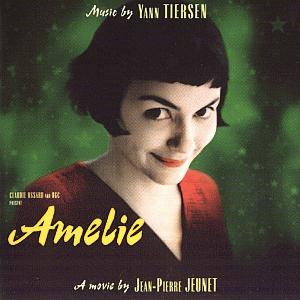************************************************************** EDITOR’s RECOMMENDATION November 2001 **************************************************************
Yan TIERSEN
Amelie from Montmartre
OST
BMG (Labels UGC/UFD) 0724381079027 [54:24]

Yann Tiersen’s music for Amelie seems to breathe the heart and soul of Paris. It has all the characteristics and colour we associate with the traditional music of the ‘City of Lights’, but with an added bonus that is the big heartedness of Amelie. Tiersen seems to have reached very well, not only Amelie’s essential generosity of spirit, but her own core loneliness and the melancholy of her situation too. Like the film this is a feel-good score. Tiersen plays toy piano, carillon, banjo, mandolins, guitar, harpsichord, vibraphon, accordion, piano,bass guitar, and melodica. The most prominent instruments as one can imagine are the accordion and harmonica. The style of the music is often quite minimalist, not far from that of Philip Glass. Very simple themes are treated with subtle modulations and shifts of accent and colour to keep tedium at bay (just about at times!) The music works very well with the film but, attractive as it is, less is often more and some judicious editing to shorten some tracks might not have gone amiss. I hasten to add there is much to captivate the ear including some engaging novelties: a typewriter adds colour in ‘La Dispute’, claps and whistling add colour to opposing guitars in the quirky ‘Soir de Fête’ and the quaint music-box atmosphere of ‘La redécouverte’ beguiles. Two vintage source numbers are included: a 1931 recording of ‘Guilty’ (of loving you) and the 1934 number ‘Si tu n’étais pas là’.
An atmospheric and delightful souvenir of an outstanding, popular French film.
Ian Lace

Paul Tonks adds:-
Director Jean-Pierre Jeunet was blessed with a magical coincidence in chancing upon the music of Yann Tiersen. As soon as he did, he rushed to obtain all of the artists’ solo albums and confirm he was as perfect for the film as he already thought after hearing just one isolated piece of music on the radio. This reviewer couldn’t applaud that decision more. This is the best example of film and music working in the way it’s supposed to that I’ve enjoyed in a long time.
Amelie is a French girl with complications. Except, she’s also a girl with enviable simplicity. The two halves of her life are resolved by seeing through the need to make life only about oneself by involving and resolving the similar dichotomies in the lives of those around her. And it’s all made possible by the onset of love.
If Audrey Tatou’s performance isn’t moving you to undiscovered heights of empathy, if Jeunet’s direction isn’t dazzling you with non-stop brilliant invention, if the heart-warming sentiment isn’t melting you into a puddle of euphoria, then at the very least the music will be keeping a smile on your face. That’s not to say this is comedy music, instead it’s upbeat lyrical stuff that constantly engages the ear.
The additionally intriguing aspect of this score is that after Jeunet fell in love with the one piece he’d heard, he fell in love with a lot more. The album therefore shows how the film’s score was a half and half combination of previously recorded works and newly composed cues. The director culled 9 of the album’s 20 tracks from Tiersen’s earlier albums. There are also 2 source cues (two 1930s rag and ballad pieces called "Guilty" and "Si Tu N’Étais Pas Là"), which means only 8 are original compositions for the film. Which matters not at all…
Flowing effortlessly into one another, this is a tinkling exercise in delicacy that perfectly captures Amelie’s overworked heart. Too much more ebullient praise might do it an injustice. So suffice to say that just as the film ought to overcome some viewer’s objection to subtitles, this music ought to perform a similar trick on those who think the accordion too much a cliché in French music.
Paul Tonks

Return to Index